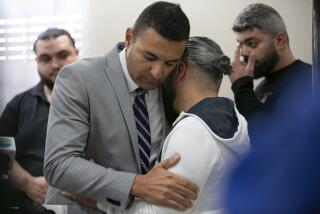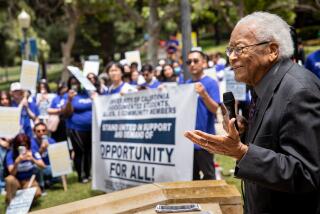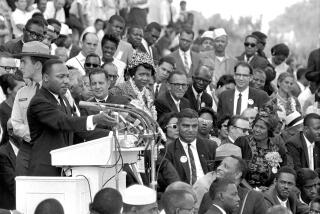Heal the Ragged Edges of Hatred
- Share via
Why is it vital to achieve a breakthrough against racism at the the United Nations’ conference on racism beginning Aug. 31 in Durban, South Africa? What would constitute a breakthrough?
The answers may seem obvious: racism, discrimination, ethnic conflict, xenophobia, marginalization, stigma and intolerance are pressing problems throughout our world, north and south, developed and developing. We need strategies to combat these scourges.
But there is a deeper chord that Durban can strike. If we are to seize the unique opportunity it offers, we must find a conversation to let us talk about the extraordinary pain we have inflicted on one another on this planet.
In his path-breaking novel “Invisible Man,” the African American writer Ralph Ellison wrote, “I am invisible, understand, simply because people refuse to see me.” The willful exclusion of other people--the decision to reduce the humanity of others--must be in our minds at Durban. Unless we can find a way to talk about the ragged edges of human hatred, we will return to a silence that is itself damaging.
I have become increasingly aware of the extent of deep hurt felt in many parts of the world at the lack of recognition of the impact of mass slavery and also of the exploitation of colonialism. There is a sense among many people that the death and suffering that resulted from slavery have never been adequately marked, much less mourned. There is a sense, too, of lost generations and opportunities that have stunted the development of poorer countries, particularly in Africa, even today. It is nearly impossible to shape a new future if old wounds are still open. Language adopted by the global community that solemnly recognizes the hurt and exploitation of the past could help to heal these wounds.
The tasks facing us are daunting. Secretary-General Kofi Annan warned that the conference already had opened “deep fissures” on such issues as slavery, colonialism and the situation in the Middle East. He said, “The conference ... must confront the past, but most importantly it must help set a new course against racism in the future.”
This will be the first global anti-racism conference of the post-apartheid era. It will confront traditional forms of racism and the plight of groups at particular risk: indigenous peoples and ethnic, religious and cultural minorities. At the same time, it will break new ground by considering victims who have not received much attention at previous international events: refugees, asylum seekers, migrants, Gypsies, trafficked persons, those of African descent in Latin America and the Caribbean.
There will be particular emphasis on the root causes of racism and discrimination and the linkages, for example, with extreme poverty. We will be looking at the phenomenon of multiple discrimination--a striking example being women who find themselves discriminated against both because they are women and because they belong to a racial or ethnic minority.
The impact of the technological revolution also will be scrutinized. The Internet is a powerful force for spreading positive messages about the value of diversity. But it is also being used by neo-Nazis and other extremist groups to spread hate.
So how do we start the deeper conversation about racism? During the recent Commission on Human Rights in Geneva, Archbishop Desmond Tutu showed us the way: “Worth is intrinsic, not dependent on anything external, extrinsic. Thus there can be no superior or inferior race. We are all of equal worth, born equal in dignity and born free, and for this reason deserving of respect.”
Archbishop Tutu’s words sum up the goal of the Durban conference: a world where racism, intolerance and discrimination are spurned and differences and diversity are celebrated.
More to Read
Sign up for Essential California
The most important California stories and recommendations in your inbox every morning.
You may occasionally receive promotional content from the Los Angeles Times.













